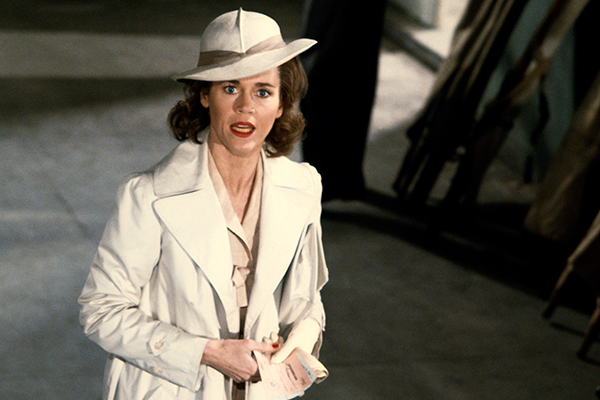Julia,
the political friendship between two women
PostED ON 18.10.2024
An intriguing historical breakdown of a screenplay and its filming experience, fully worthy of its own novel!

Julia de Fred Zinnemann (1977) © 20th Century Fox / DR
Occasionally, a single scene illuminates a film to the point of encapsulating its entirety. In Julia (1977), the magical moment happens when Lilly, incarnated by Jane Fonda, finally reunites with Julia, played by Vanessa Redgrave. Childhood friends, the two women have been separated by life and by History: the former, a writer, became a success on Broadway, and soon Hollywood, the latter, in face of the ‘rising tide of danger’, got involved in the anti-fascist and anti-Nazi resistance in the heart of Central Europe.
At the back of a bar in Berlin, Vanessa Redgrave, her eyes a flawless shade of indigo, waves to her comrade who has just entered, and I can't say exactly what's exceptional about this gesture, but it's a marvel (as is the entire scene that follows it): it contains the simple joy of seeing an old acquaintance again, while scheming to avoid the enemy prowling about, and also the art of embracing the ‘guest’ to draw her in, tipping her away from her high-society world towards reality, in short, to force her to commit herself - the major aim of Zinnemann's cinema. It takes a standout actress to suggest all this, and that year, Vanessa Redgrave certainly deserved her Academy Award for Best Supporting Actress.
The character of Lilly is Lillian Hellman (1905-1984), a great lady of American letters, a renowned playwright and screenwriter, who escaped McCarthyism. She later recounted her story about Julia in an autobiographical account, Pentimento. She sold the rights to the story to producer Richard Roth, who commissioned a screenplay from Alvin Sargent (noted for Paper Moon), convinced Jane Fonda to star in it and hired Sydney Pollack to direct the film. When Pollack, swamped with work, abandoned the project, the ‘baby’ fell into the lap of Fred Zinnemann, who was immediately keen on the idea of reinventing the Europe of his youth. However, relations with Lillian Hellman were to make the affair more complicated than anticipated.
Lillian initially lamented on the fact that her real name had been used in the movie and that she was central to its plot: “This is not a work of fiction and certain laws have to be respected for that reason... For me, the main difficulty lies in the treatment of Lillian as the main character. The simple truth is that whatever she did in the story - and I don't deny the danger I faced in taking the money to Germany - the role was passive." Later, she announced that, quite unbelievably (and contrary to her own account), that the real Julia lived in New York and that legal reasons prevented her from revealing her name...
Zinnemann quickly became frustrated with this complicated collaboration: “In her mind, Lillian Hellman owned half of the Spanish Civil War, while Hemingway owned the other half. She acted out situations that weren't real. She was an extremely talented and brilliant writer, but I'm sorry to say she was a phoney character. My dealings with her were very guarded, and they ended in pure hatred."
A few years later, several historians established that Julia had never existed, or that she was a composite of several great resistance fighters (including a certain Muriel Gardiner who, ever since the film, has been obliged to repeat that no, Julia was not her). Lillian Hellman continued, against all the evidence, to maintain that she hadn't invented anything. Did the filmmaker know this intuitively? There is something almost theoretical about his mise en scène, which never fails to bring two irreconcilable entities into conflict. Reality and fiction? Whatever the truth, the film is one of Zinnemann’s finest, carried by outstanding actors (Jason Robards won the Academy Award for Best Supporting Actor for his portrayal of Dashiell Hammett, Hellman's life partner).
Whatever you do, don't resist the emotion that engulfs you.
Aurélien Ferenczi
Screenings:
Julia by Fred Zinnemann (1977, 1h58)
UGC Astoria Fri 18 5:15pm | Institut Lumière (Villa) Sat 19 5pm | Institut Lumière (Villa) Sat 19 5:15pm

